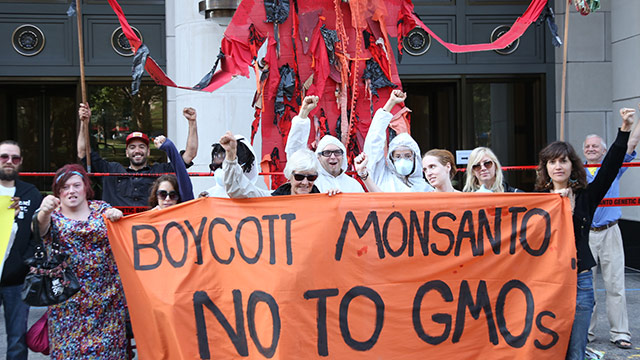 Guatemala rejects 'Monsanto Law' that would have given multinational seed companies control over agriculture
Guatemala rejects 'Monsanto Law' that would have given multinational seed companies control over agriculture(NaturalNews) New legislation dubbed the "Monsanto Law" has been roundly rejected by activist groups and citizens in Guatemala, who argue that it has put the nation's food security and farm economy in jeopardy.
The law, formerly called "Law for the Protection of New Plant Varieties," was approved by the Guatemalan congress June 10, but has been widely panned since. Supporters say it is designed to protect the intellectual property of plant breeders who were deemed to have "created" or "discovered" new plant varieties, or who have genetically modified existing varieties.
The law effectively permits "breeders" -- which are typically biotech giants like Monsanto -- to obtain property rights over the use of plant varieties, in the form of both plants and seeds.
Violates the rights of indigenous peoplesIn a new report, the activist organization CER Ixim warned about the consequences of the "Monsanto Law." The group said that, under the new law, the possession or exchange of seeds of protected varieties without the owner's consent will be illegal and could lead to jail sentences for violators.
In addition, noted CER Ixim, it will be illegal to possess any harvest from such seeds or to save them for future plantings. The law goes on to say that a breeder's rights extend to "varieties essentially derived from the protected variety." That also means a hybrid produced from a covered variety after crossbreeding with an uncovered variety is automatically covered under the law as well.
The group said the new law promotes privatization and seed monopolization, which is a danger to food sovereignty, especially for indigenous peoples. And the group's report warned that the country's biodiversity will now fall "under the control of domestic and foreign
companies."
The law, known as Decree 19-2014 in Guatemala's law books, is the result of a process stemming from the 2005 signing of a free-trade agreement between Central American countries and the U.S., the Central America Free Trade Agreement, or CAFTA. Under terms of that pact,
Guatemala is bound to abide by the International Convention for the Protection of New Plant Varieties agreement.
In 2006, after Guatemala moved to join CAFTA, the Foreign Trade Economics Legislative Committee crafted legislation for the International Union for the Protection of New Varieties of Plants for approval.
According to CER Ixim, the proposed legislation was never opened for debate with the general public or indigenous peoples.
Another anti-GMO group, the Social Collective for the Right to Food, found that the law is in violation of the provisions of ILO Convention 169, "by penalising the use of seeds for future plantings, thus truncating the natural cycle of life and plant reproduction."
Opposition to the
Monsanto Law has grown in the country since its passage and it continues to widen, now coming from a diverse sector of civil society, including indigenous organizations, scientists, environmental groups, artists and even members of Congress.
Law may even be unconstitutionalMario Itzep, coordinator of the Indigenous Observatory, says that the law threatens the food security of the entire nation, according to a report by
Bilaterals.org. He also said that the law violates the natural rights of indigenous peoples, because it misappropriates seeds used and produced by traditional cultures.
And Domingo Hernandez, a member of the Maya Ukux Be association, says the law is an affront to indigenous cultures, because for one thing, it will make them dependent on transgenic GMO seeds,
Bilateral.org reported, quoting from a translated Guatemalan news report.
In addition, the anti-GMO group National Alliance for Biodiversity Protection has proclaimed that the law is unconstitutional "because it violates the rights of peoples."
"It will benefit transnational seed companies such as
Monsanto, Duwest, Dupont, Syngenta, etc.," the group proclaimed, according to
Bilateral.org.
"According to this law, the rights of plant breeders are superior to the rights of peoples to freely use seeds," the Alliance said in a
statement issued in late July.
http://www.naturalnews.com/046816_Monsanto_Law_GMOs_Guatemala.html